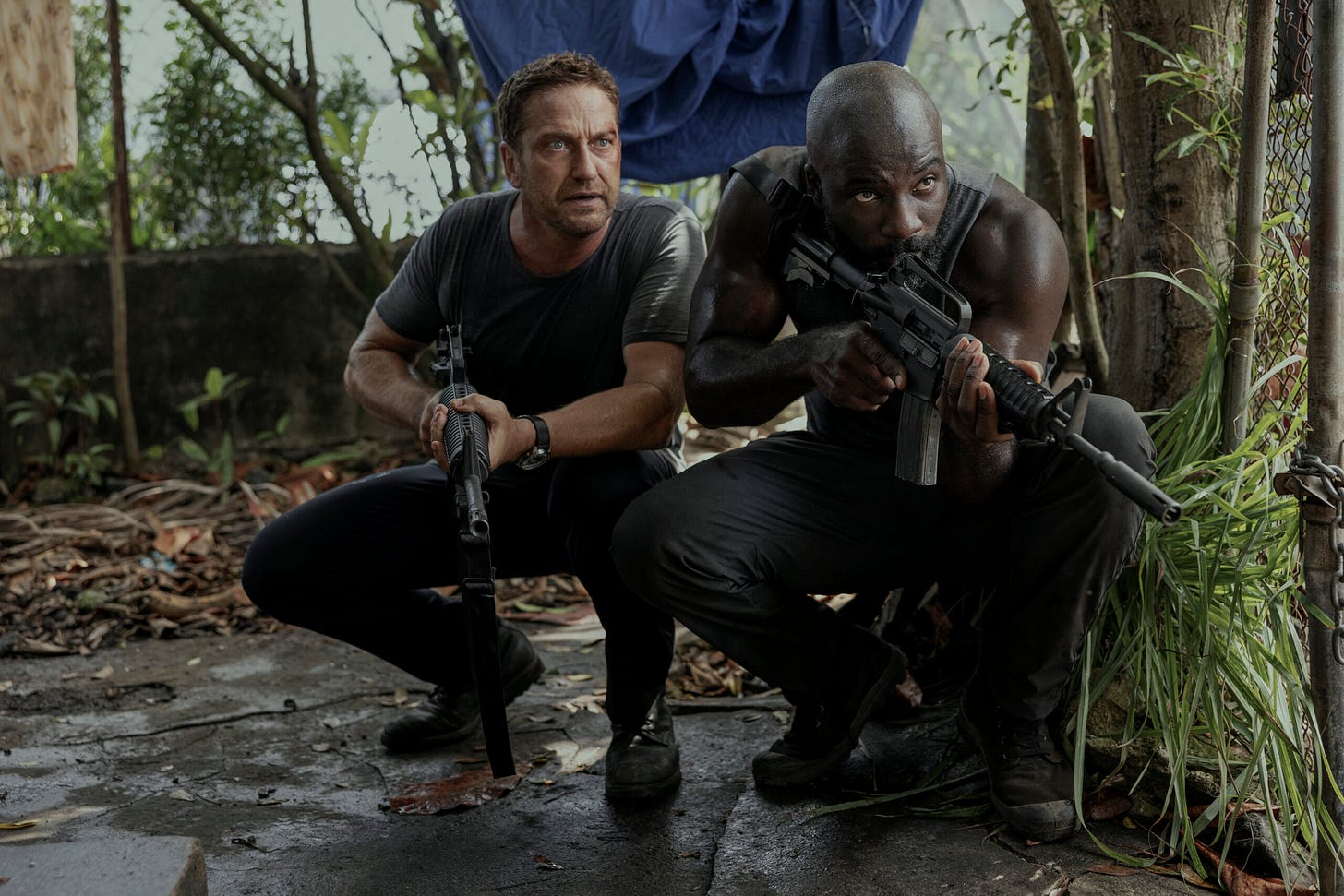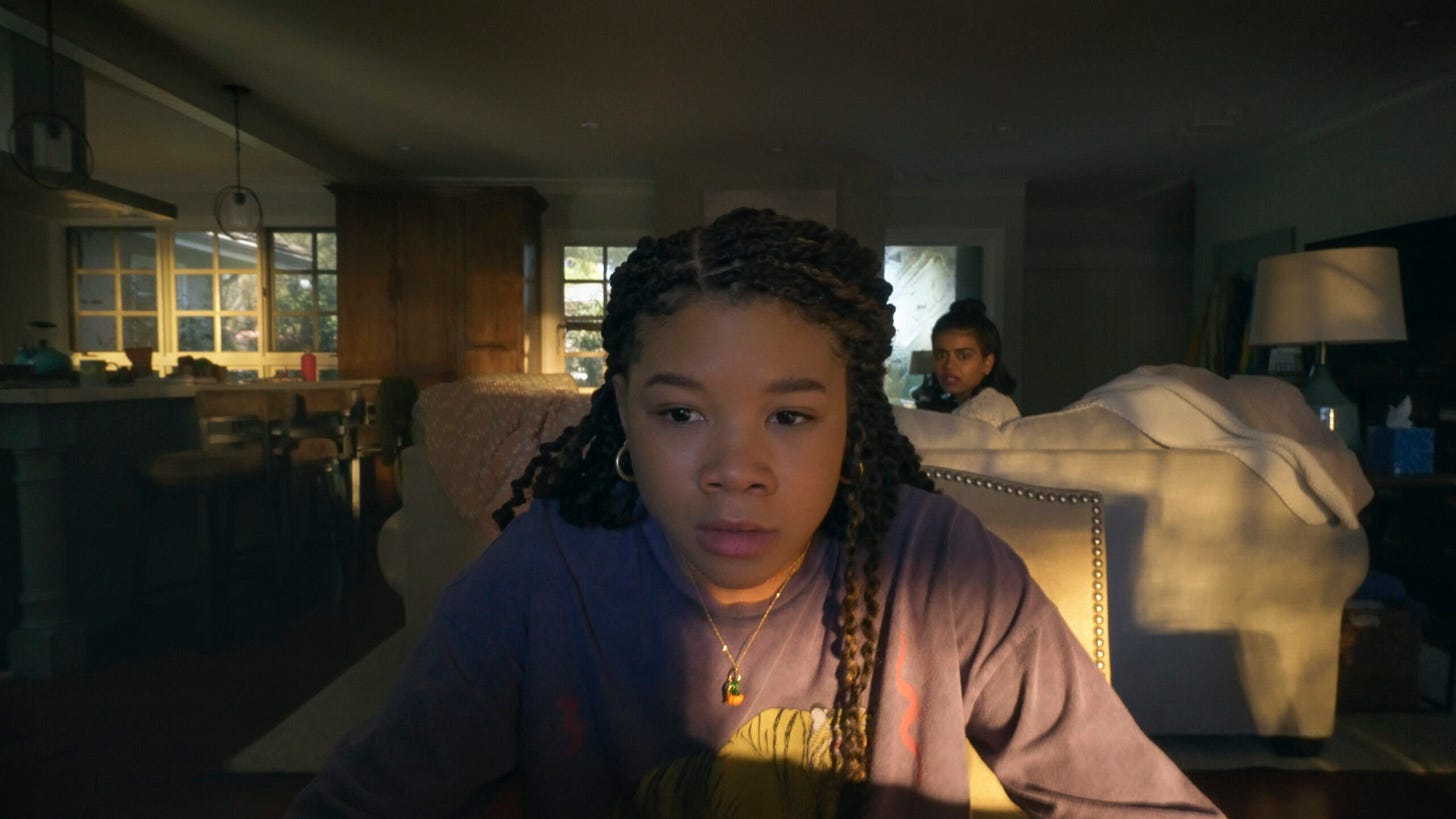‘Missing’ Review
Plus, a quick ride on Gerard Butler’s ‘Plane.’
Missing is the latest entrant of what might be called the Screens-Onscreen genre of filmmaking, the effort to simulate for viewers what the characters can see on various screens (laptops, primarily, but also phones, tablets, etc.). About a teen girl looking for her mother who has gone missing while on a vacation with her boyfriend in Colombia, Missing is from some of the team who made Searching, a movie about … a father who is searching for his teen daughter who has gone missing.
The setup is pretty straightforward and reasonably well done: We see the movie almost entirely through the phone and computer of June (Storm Reid), who spends a week at home alone, partying with her friends and mostly brushing off texts from her mom, Grace (Nia Long), and boyfriend, Kevin (Ken Leung). When neither her mother nor Kevin shows up at the airport at the appointed pickup time, June begins a panicked hunt for them via Colombian security and tourist cams with the aid of Javier Ramos (played by ’90s action villain god Joaquim de Almeida). As the mystery unravels, dark secrets from June and Grace’s past are revealed, yadda yadda yadda.
I say it’s reasonably well done because the whole thing is fundamentally based on a cheat: We see June’s face constantly because she constantly has her FaceTime app open on her laptop for no discernible reason. Well, I mean, we can discern the reason. The reason is that directors Nicholas D. Johnson and Will Merrick wanted to avoid long stretches where we’re looking at nothing but files on her laptop as she jots down notes and the such. But it’s still a cheat. No one uses their computer like that.
I can imagine entire fields of study springing up around this microgenre—other prominent examples include Unfriended and Unfriended: Dark Web, as well Host and special episodes of sitcoms Mythic Quest and Parks and Rec—and what it means for the ways in which we interact with the world, with each other, with art, with society. In the case of Host, Mythic Quest’s “Quarantine,” and “A Parks and Recreation Special,” it’s hard to disambiguate specific tensions over COVID from general moves to technology-assisted human interaction communication.
As time capsules, those are undoubtedly interesting. And as art, they’re mostly successful; the Mythic Quest episode in particular did a great job of using Zoom-style chats to heighten character traits and demonstrate the difficulty of really helping people when you’re forced to communicate with them solely through a screen. Sometimes we all need a hug, you know?
The Unfriendeds and Missing/Searching are more interesting, at least from a theory-of-cinema point of view, because they are dealing with a new, ever-present facet of human existence. Watching people shuffle files around on a desktop may not be as beautiful as watching a character in a Terrence Malick movie softly hold his hand above the knee-high grains and grass in the twinkling dusk. Seeing them interact thousands of miles apart via the miracle of wifi and 5G is not exactly the same as watching a Coppola-esque staredown between mafia dons and their apparatchiks. The ellipsis that appears, then disappears, while you’re waiting for an important text message is different from the pregnant pause in an Anthony Hopkins monologue. But all are representative of how we live now, a miracle of modern science that connects people—visually, verbally, and textually—across unimaginable space.
Day-to-day life and the relationships that make up each day are, in other words, not entirely different from the relationship between viewer and film. The space between artifice and reality has flattened noticeably for all of us. We are all directors, screenwriters, cinematographers, working on mastering the angles of our own faces, the pace and tone of our words, the lighting of our rooms. We live a mediated life, and Missing and its brethren highlight the natural artificiality of everything we do.

Gerard Butler and Mike Colter in Plane. (Photo courtesy of Lionsgate)
Plane is the Ambulance of 2023, the high-concept, one-word action-adventure film in which a conveyance serves as a location for much of the film. I noted last week that part of the appeal of the movie is the simplicity of the title; I wanted to see the latest big dumb Gerard Butler movie because it had a short dumb name.
And it didn’t disappoint! Butler stars as Captain Brodie Torrance, trying to squeeze one last round of flights in before New Year’s Eve, which he plans to spend with his daughter at their Hawaii home. His nearly empty plane is being used to transport a dozen or so regular passengers plus captured fugitive Louis Gaspare (Mike Colter) and his captor. As you may have seen from the trailer, the plane goes down after trying to fly through a lightning storm, crashing on an island somewhere in the Pacific.
Bad news! This island is run by militia members and violent separatists. Can Captain Brodie keep them safe long enough for the cavalry, in the form of mercs hired by PR fixer/all-around-hatchet man Scarsdale (Tony Goldwyn)? Is Gaspare a dirtbag criminal or a killer with a heart of gold? Will the plane prove to be more useful later in the film than it was in the first half hour?
If you are actually unsure of the answer to any of these questions, Plane may not be the movie for you. Its strength is its predictability; this is a basic, high-concept action programmer of the sort that each studio used to make two or three times a year in the hopes of a.) filling out their release calendar and b.) possibly hitting gold by creating a basic-cable classic that drives revenue for years to come via the TBS/TNT rotation. I imagine in six months or so we’ll see the modern equivalent when Plane hits Netflix (or some other streaming service) and shoots to the top of the most-watched charts there.
Gerard Butler continues his reign as the king of the dirtbag B-movie, be it something like Plane or Geostorm or Den of Thieves (a.k.a. Idiot Heat). Colter has a hulking, soulful presence that has served him well on the television show Evil and in the film South of Heaven. Director Jean-François Richet brings just enough style to the proceedings to keep things from getting boring, visually; his Blood Father with Mel Gibson back in 2016 is another solid entrant in this particular variety of “not great or high art, but solid and entertaining” filmmaking.



